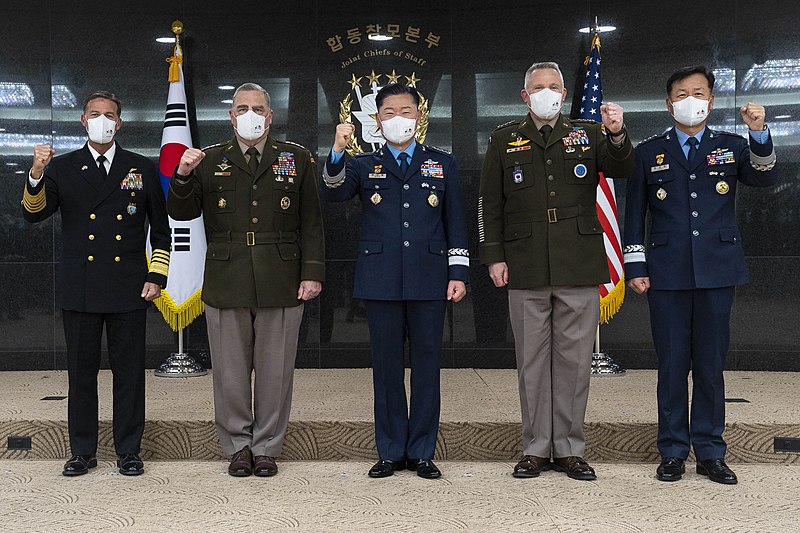Amidst tensions in the Korean peninsula, South Korea and the United States are keen to boost deterrence against the numerous missile and weapons tests that North Korea has carried out so far this year. Seoul and Washington will be resuming live field training in the annual joint military exercises this year.
South Korea’s defense ministry announced Friday last week that South Korea and the United States will be resuming their live field training during their joint military exercises this year.
This comes as the two countries are set to start their annual joint military exercises next month, following the pledge by South Korean President Yoon Suk-yeol to bolster deterrence against North Korea by normalizing joint drills with the US.
The defense ministry said the two countries plan to carry out 11 field exercises, including one brigade-level drill in the summer. The two countries are aiming to hold more joint regiment-level drills or higher.
“We plan to stage combined air carrier strike group training and drills for amphibious operations at an early date among others,” South Korean defense minister Lee Jong-sup told reporters.
South Korea and the US scaled back their joint military drills in an effort to lower tensions with North Korea. However, this comes at a time when Pyongyang is expected to carry out its first nuclear test this year, the first since 2017. Yoon previously said North Korea could carry out its nuclear test at any time.
The South Korean defense ministry also said that it plans to improve missile detection capabilities and push for an early deployment of an interceptor system.
On the same day, South Korea’s foreign ministry voiced its objections to Japan’s claims on contested islets. The islets, named Dokdo in South Korea and Takeshima in Japan, were claimed by Tokyo in its annual white paper.
The ministry then demanded that Japan walk back its claims over the islets.
The South Korean government “strongly protests Japan’s repetition of sovereignty claim over Dokdo, clearly an integral part of the Korean territory in terms of history, geography, and international law, and urges it to immediately scrap it. Such a move is of no help to efforts for building ‘future-oriented’ bilateral relations,” said the South Korean foreign ministry spokesperson Choi Young-sam in a statement.



 Israel-Hezbollah Escalation Deepens Lebanon’s Role in Middle East Conflict
Israel-Hezbollah Escalation Deepens Lebanon’s Role in Middle East Conflict  Trump Offers U.S. Insurance and Naval Escort for Tankers as Strait of Hormuz Crisis Disrupts Global Oil Trade
Trump Offers U.S. Insurance and Naval Escort for Tankers as Strait of Hormuz Crisis Disrupts Global Oil Trade  U.S. Begins Charter Evacuations as Iran Conflict Disrupts Middle East Air Travel
U.S. Begins Charter Evacuations as Iran Conflict Disrupts Middle East Air Travel  Young Trump Voters Divided After U.S. Strike on Iran and Death of Ayatollah Khamenei
Young Trump Voters Divided After U.S. Strike on Iran and Death of Ayatollah Khamenei  Australia and Canada Strengthen Critical Minerals Partnership Through New G7 Alliance Agreements
Australia and Canada Strengthen Critical Minerals Partnership Through New G7 Alliance Agreements  Brazil Senate Approves Mercosur–EU Trade Agreement After Decades of Negotiations
Brazil Senate Approves Mercosur–EU Trade Agreement After Decades of Negotiations  Santander’s $12.2B Webster Financial Deal Faces Uncertainty Amid U.S.–Spain Trade Tensions
Santander’s $12.2B Webster Financial Deal Faces Uncertainty Amid U.S.–Spain Trade Tensions  Trump Defends Extended U.S.-Israel Military Campaign Against Iran
Trump Defends Extended U.S.-Israel Military Campaign Against Iran  Suspected Iranian Drone Hits CIA Station at U.S. Embassy in Riyadh Amid Rising Middle East Tensions
Suspected Iranian Drone Hits CIA Station at U.S. Embassy in Riyadh Amid Rising Middle East Tensions  Middle East Air War Triggers Massive Flight Cancellations and Global Airline Disruptions
Middle East Air War Triggers Massive Flight Cancellations and Global Airline Disruptions  U.S. Preparing Possible Corruption Charges Against Venezuelan President Delcy Rodriguez
U.S. Preparing Possible Corruption Charges Against Venezuelan President Delcy Rodriguez  Defense Contractors Move to Drop Anthropic AI After Trump Administration Ban
Defense Contractors Move to Drop Anthropic AI After Trump Administration Ban  Big Tech Signs White House Pledge to Fund Power for AI Data Centers
Big Tech Signs White House Pledge to Fund Power for AI Data Centers  European Allies Deploy Air Defenses to Cyprus After Drone Attack on RAF Akrotiri Base
European Allies Deploy Air Defenses to Cyprus After Drone Attack on RAF Akrotiri Base  U.S. Military Strikes on Iran Complicate Xi-Trump Summit and Expose China’s Energy Risks
U.S. Military Strikes on Iran Complicate Xi-Trump Summit and Expose China’s Energy Risks  U.S. Pledges Support to Turkey After Iranian Missile Threat
U.S. Pledges Support to Turkey After Iranian Missile Threat 




























